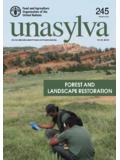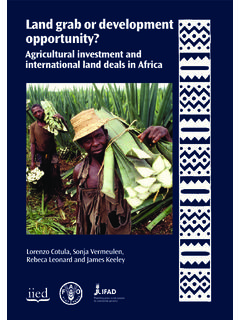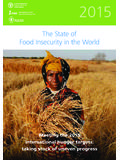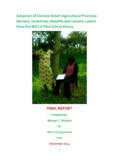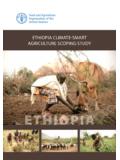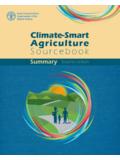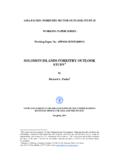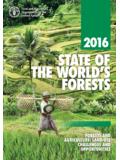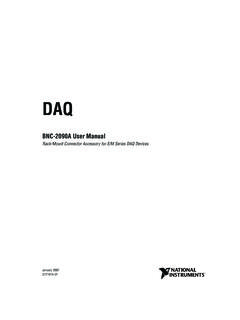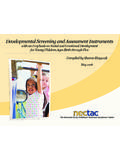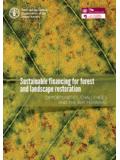Transcription of of Tenure Governance of Tenure responsible - fao.org
1 Of Tenure Governance of Tenure Voluntary Guidelines on the vernance Tenure responsible Governance of Tenure The guidelines are the first comprehensive, global instrument on Tenure and its administration to be prepared through intergovernmental negotiations. Governance The guidelines set out principles and internationally accepted standards of responsible practices for the use and control ofof Tenure land, fisheries and forests. They provide guidance for improving the policy, legal and organizational frameworks that regulate Tenure rights; for enhancing the transparency and administration of Tenure systems; and for strengthening of Land, Fisheries and Forests in the capacities and operations of public bodies, private sector enterprises, civil society the Context of national Food Security organizations and people concerned with Tenure and its Governance .
2 The guidelines place the Governance of Tenure within the context of national food security, and are intended to contribute to the progressive realization of the right to adequate food, poverty eradication, environmental protection and sustainable social and economic development. rnance Governance nure of Tenure nance Governance ure of Tenure ISBN 978-92-5-107277-6. 9 7 8 9 2 5 1 0 7 2 7 7 6. I2801E/1 VOLUNTARY GUIDELINES ON THE. responsible Governance of Tenure OF LAND, FISHERIES AND FORESTS IN. THE CONTEXT OF national FOOD SECURITY. FOOD AND AGRICULTURE ORGANIZATION OF THE UNITED NATIONS.
3 Rome, 2012. The designations employed and the presentation of material in this information product do not imply the expression of any opinion whatsoever on the part of the Food and Agriculture Organization of the United Nations (FAO) concerning the legal or development status of any country, territory, city or area or of its authorities, or concerning the delimitation of its frontiers or boundaries. The mention of specific companies or products of manufacturers, whether or not these have been patented, does not imply that these have been endorsed or recommended by FAO in preference to others of a similar nature that are not mentioned.
4 ISBN 978-92-5-107277-6. All rights reserved. FAO encourages the reproduction and dissemination of material in this information product. Non-commercial uses will be authorized free of charge, upon request. Reproduction for resale or other commercial purposes, including educational purposes, may incur fees. Applications for permission to reproduce or disseminate FAO copyright materials, and all queries concerning rights and licences, should be addressed by e-mail to or to the Chief, Publishing Policy and Support Branch, Office of Knowledge Exchange, Research and Extension, FAO, Viale delle Terme di Caracalla, 00153 Rome, Italy.
5 FAO 2012. Contents PREFACE iv 1 Preliminary 1. Objectives 1. 1. 2. Nature and scope 2. 2 General matters 3. Guiding principles of responsible Tenure Governance 3. 3. 3A General principles 3. 3B Principles of implementation 4. 4. Rights and responsibilities related to Tenure 6. 5. Policy, legal and organizational frameworks related to Tenure 7. 6. Delivery of services 9. 3 Legal recognition and allocation of Tenure rights and duties 11. 7. Safeguards 11. 8. Public land, fisheries and forests 12. 9. Indigenous peoples and other communities with customary Tenure systems 14. 10. Informal Tenure 16.
6 4 Transfers and other changes to Tenure rights and duties 11. Markets 19. 19. 12. Investments 20. 13. Land consolidation and other readjustment approaches 23. 14. Restitution 25. 15. Redistributive reforms 25. 16. Expropriation and compensation 27. 5 Administration of Tenure 29. 17. Records of Tenure rights 29. 18. Valuation 30. 19. Taxation 31. 20. Regulated spatial planning 32. 21. Resolution of disputes over Tenure rights 33. 22. Transboundary matters 33. 6 Responses to climate change and emergencies 35. 23. Climate change 35. 24. Natural disasters 36. 25. Conflicts in respect to Tenure of land, fisheries and forests 37.
7 7 Promotion, implementation, monitoring and evaluation 39. Preface The purpose of these Voluntary Guidelines is to serve as a reference and to provide guidance to improve the Governance of Tenure of land, fisheries and forests with the overarching goal of achieving food security for all and to support the progressive realization of the right to adequate food in the context of national food security. These Guidelines are intended to contribute to the global and national efforts towards the eradication of hunger and poverty, based on the principles of sustainable development and with the recognition of the centrality of land to development by promoting secure Tenure rights and equitable access to land, fisheries and forests.
8 The eradication of hunger and poverty, and the sustainable use of the environment, depend in large measure on how people, communities and others gain access to land, fisheries and forests. The livelihoods of many, particularly the rural poor, are based on secure and equitable access to and control over these resources. They are the source of food and shelter; the basis for social, cultural and religious practices; and a central factor in economic growth. It is important to note that responsible Governance of Tenure of land, fisheries and forests is inextricably linked with access to and management of other natural resources, such as water and mineral resources.
9 While recognizing the existence of different models and systems of Governance of these natural resources under national contexts, States may wish to take the Governance of these associated natural resources into account in their implementation of these Guidelines, as appropriate. How people, communities and others gain access to land, fisheries and forests is defined and regulated by societies through systems of Tenure . These Tenure systems determine who can use which resources, for how long, and under what conditions. The systems may be based on written policies and laws, as well as on unwritten customs and practices.
10 Iv PREFACE. Tenure systems increasingly face stress as the world's growing population requires food security, and as environmental degradation and climate change reduce the availability of land, fisheries and forests. Inadequate and insecure Tenure rights increase vulnerability, hunger and poverty, and can lead to conflict and environmental degradation when competing users fight for control of these resources. The Governance of Tenure is a crucial element in determining if and how people, communities and others are able to acquire rights, and associated duties, to use and control land, fisheries and forests.
